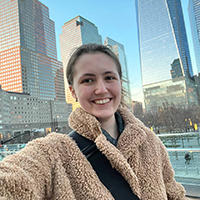by Karolina Naidon

|
Karolina Naidon is a Vassar College freshman born and raised in Dnipro city, Ukraine. She is a finalist and co-mentor in Ukraine Global Scholars, a non-profit that helps Ukrainian students to apply to top institutions worldwide, and a participant in the all-Ukrainian TED-Ed Talk 2021. Karolina was a researcher at the Junior Science Academy of Ukraine in history and environmental studies and participated in numerous all-Ukrainian and international conferences, presenting her research results. |
***
As of today, the Ukrainian nation has resisted the unprovoked full-scale invasion from the Russian Federation for one year. Since February 24th, 2022, Ukrainians have shared the same dream of gaining back their country’s sovereignty and independence and rebuilding it after the war's end. The TCUP Conference on February 9-10 focused on the topic that concerned most Ukrainians’ minds: how to rebuild the country after the war and determine the next steps of Ukrainian political development. This conference was crucial to hear for everyone as many Ukrainian refugees who come back find only debris and smoke in the place they used to call “home.”
As a participant of Ukraine Global Scholars, a non-profit that helps Ukrainians apply to top institutions worldwide, I was interested in hearing the experts' thoughts and reflecting on how I could help Ukraine now. While studying at Vassar College, I was delighted to join online for the first day of the conference and hear the speakers’ thoughtful answers to challenging questions. Ambassador John Herbst facilitated the first panel with historian Joachim von Puttkamer, former Minister of Foreign Affairs of Ukraine Pavlo Klimkin, political analyst Kateryna Shynkaruk, and Alternative Executive Director at the IMF Vladyslav Rashkovan.
To understand why the full-scale invasion occurred and why Ukrainians, since 2014, resist the presence of Russia in their land, everyone must look back to the history of Ukraine. Joachim von Puttkamer explained some of the core misconceptions about Ukrainian history. He emphasized how Western states were exposed to the imperialistic view of Russia, which considered Ukraine simply a province that came out of the Russian empire and was torn by “ethnic conflict” in 2014. He also discussed political obstacles that might challenge world security as Ukraine attains victory: continuous negotiations of ceasefire with Russia that are entirely ignored by the latter and a counter-offensive in Crimea. Moreover, considerations of world security also raise concerns about which security guarantees can be made to protect Ukraine. As seen from outcomes of the Budapest Memorandum, paper agreements with Russia will never work well. As a person who plans to pursue a diplomatic career, the discussion made me reflect on how to obtain security guarantees for Ukraine so that these atrocities would never happen again.
Pavlo Klimkin, the former Minister of Foreign Affairs of Ukraine, provided tremendous direct insight into the complex geopolitical situation and emphasized that Ukraine would not believe in security guarantees just written on paper. Nothing is impossible in the current political and military situation. We can continue the approach used previously during the Cold War of deterrence and containment, but other approaches could be taken, too. Any temporary solution would bring only more difficulties to the current situation in Ukraine.
Kateryna Shynkaruk added crucial points about the current unity of Ukrainians and how a loss for Ukraine would undermine international law in the future. Weak responses and concessions would only embolden Russia further and diminish Ukrainian existence. Russia must recognize Ukraine as an independent country, and no pacifist flexibility should be provided to Russia from the West and NATO. We can hardly imagine that Ukraine would sign an agreement accepting that some of its territories belong to Russia. The speaker underlined that there is no return to the previous world order, and I could not agree more with that. After bombardments of the residential quarters, torture of civilians and service members, looting of houses, and raping children and elderly in the middle of Europe, the world can never be the same.

Vladyslav Rashkovan introduced an economic perspective on how to help Ukraine win the war and rebuild itself after the victory. He emphasized that after the Second World War, sanctions became the primary tool for peacekeeping. If the situation from 2014 repeats when countries at first put sanctions and then released Russia from them, it will not stop aggression nowadays. Even though Russia acts as though sanctions do not affect it, the aggressor state has become dependent on India, Iran, China, and North Korea, making their economy more dependent on gas exports and military imports. Russian oligarchs’ assets kept in the EU banks and worldwide reserves can be potentially used for rebuilding Ukraine. Currently, countries are reluctant to put severe sanctions on Russia, concerned with not switching the world order completely. All speakers reflected on the possibility of Russia using nuclear bombs in Ukraine and possible developments in the global defence sector.
I was grateful for the speakers who shared their thoughts about the current geopolitical situation and peacebuilding guidance. As a Ukrainian student who fled the occupation on her own, it was essential to hear the strong positions about defending the sovereignty of Ukraine and to learn about the potential escalation of the unprovoked invasion.
